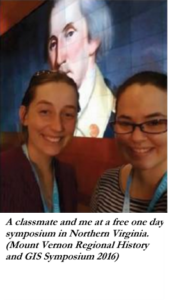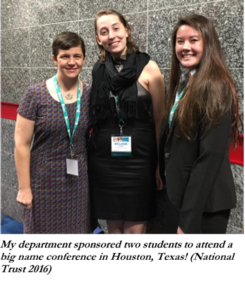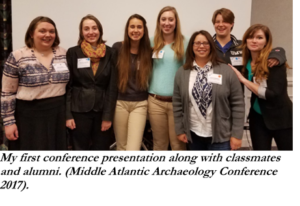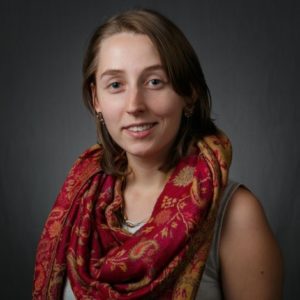Has anyone ever asked you or have you thought about attending a professional conference in your field? No? Why?! I know there can be a lot of anxieties and logistical concerns for a student, but don’t let that stop you! These were some of my fears about attending a conference; sound familiar?

- I don’t think there are many conferences for my field.
- They are probably expensive and definitely too far away.
- I do not have time to take a day or a whole weekend away from classes.
- Networking sounds exhausting, uncomfortable, and who would want to talk to an undergrad.
- I barely know anything.
- What is the point?
You may be surprised to find that most of these are untrue. During my two years after transferring to the University of Mary Washington I attended eight professional conferences or similar events. Just one conference is an eye-opening experience. So if you have never before thought of conferences as the next important step to your career, let me pass on a valuable advantage and dispel some of the myths surrounding conferences.
Are there conferences in my field?
100% Yes. Everything you could possibly study has a professional network that will meet at conferences to share their work with peers. There are international, national, regional, state, and local groups so you can start at a size and formality level comfortable for you.
Tip: Look for symposiums, annual meetings showcases, and meetups too.
Will there be conferences around here?
Absolutely! The University of Mary Washington is located within commuting distance of Washington D.C. metro area which is a major destination for national professional conferences. I recommend a discipline specific online search for a conference Washington D.C. and I guarantee there will be something. The larger conferences usually move around on a cycle through big cities, and you should be prepared to go when they are close. The local and state groups will have conferences closer and you may be able to carpool with a classmate.
Tip: Many conferences do live streaming.
How expensive are conferences?
Students, or young professionals, usually receive a discounted registration fee to make the conference attendance affordable. Look on the conference website for scholarships or volunteer opportunities that tend to cover attendance and apply for them. Talk to your department about possible sponsorship to cover some of the costs. Now is the best time to see what conferences are like without paying the full registration price, which will be more expensive further into your career if your job does not cover professional development.
Tip: Think about carpooling with classmates, share a hotel, and ask if the conference hosts dinners or has a breakfast bar, there are many tricks to making conferences affordable on a student budget.
What is the time commitment?
That is up to you. You are never required to attend the entirety of a conference so make it work for your schedule. Conferences can be held during the work week, weekend and be anywhere from one to four days. Most conferences have schedules posted early or past programs available so if you only have one day to go you can pick the day that you’ll learn the most. Many professors will understand an absence for professional advancement so talk to them about this opportunity. Just be upfront with potential sponsors as they will want you to attend as much of the conference as possible.
Networking. Do I have to?
Not in the way you think. Networking is one of the biggest concerns students have and it is not the bad word you think it is. A network is just a safety net of peers in your field who you can reach out to for advice, information, and opportunities. You do not have to be a natural socialite because you probably already share a common interest in your field that can help easily start a conversation. Some techniques include chatting with the people sitting next to you or congratulating a speaker on their paper if it is something that interests you.
Tip: Print business cards. I printed out well over a hundred cards and have passed all of them out by the time I graduated. Conferences are a great way to get your name out there. Write something on the card to remind them where they met you, or maybe a note about your conversation. Always try to follow up by email after the conference to build and maintain a relationship.

Can students contribute to the conference?
Of course, you are the future of your field and your insight and work in the field matter more than you may think. There are opportunities for students to create and present posters to start sharing your work with other professionals, some with prizes and the possibility for publication. Presenting is not just for graduate students and UMW has grants available to help cover costs for students who are presenting. Most professionals recognize this and take pride in helping the next generation navigate conferences and can give you a step up in your conference game.
Tip: Tap into the network you already have professors and classmate if they are willing to introduce you to anyone they know at a conference. These are the easiest connections to make and will remind you of your importance to the field as a rising professional.
I hope you can see how attending a conference is an important next step in your career. It will help you know your peers and stay up to date on current research. Attending conferences was instrumental to making me feel secure in my future. Conferences introduced me to my summer internship as a geospatial information system (GIS) technician with the cultural resource management department of the international engineering firm AECOM. It gave me the opportunity to be a volunteer illustrator with Archaeology in the Community. You too will benefit from going to a conference, so why wait?

More questions? Visit the Career Center in the University Center, Suite 206 or contact them at by email at ccpd@umw.edu or via phone 540-654-5646
A special thank you to the Historic Preservation and Geography departments, who showed me their commitment to student success by sponsoring my attendance at almost all of the conferences I highlighted in this article. I could not have done it without them.
UMW students and faculty pictured: Emma Spear ’18, Courtney Kuzemchek ’17, Sarah Rodgers ’17, Professor Henry, Sam Biggers ’16, Michelle Finnegan ‘17, Ian Purcell ’18, Kara Saffos ’15, Cheyenne Johnson ’18, Alison Cramer ‘16, Professor McMillan, Morgan Fries ’18, and Elyse Adams ’16.
Melanie Fueschsel’s LinkedIn: www.linkedin.com/in/melanie-fuechsel-8b28ba60
Resources
College of Arts and Sciences
Undergraduate Research in the Liberal Arts and Sciences: http://cas.umw.edu/undergraduate-research-in-the-liberal-arts-and-sciences/
College of Education
Student Organizations: http://education.umw.edu/student-resources/student-organizations/
Student Research Funding: http://education.umw.edu/student-resources/student-research-funding/
College of Business
Student Research Grants: http://business.umw.edu/current-students/student-opportunities/student-research-grants/